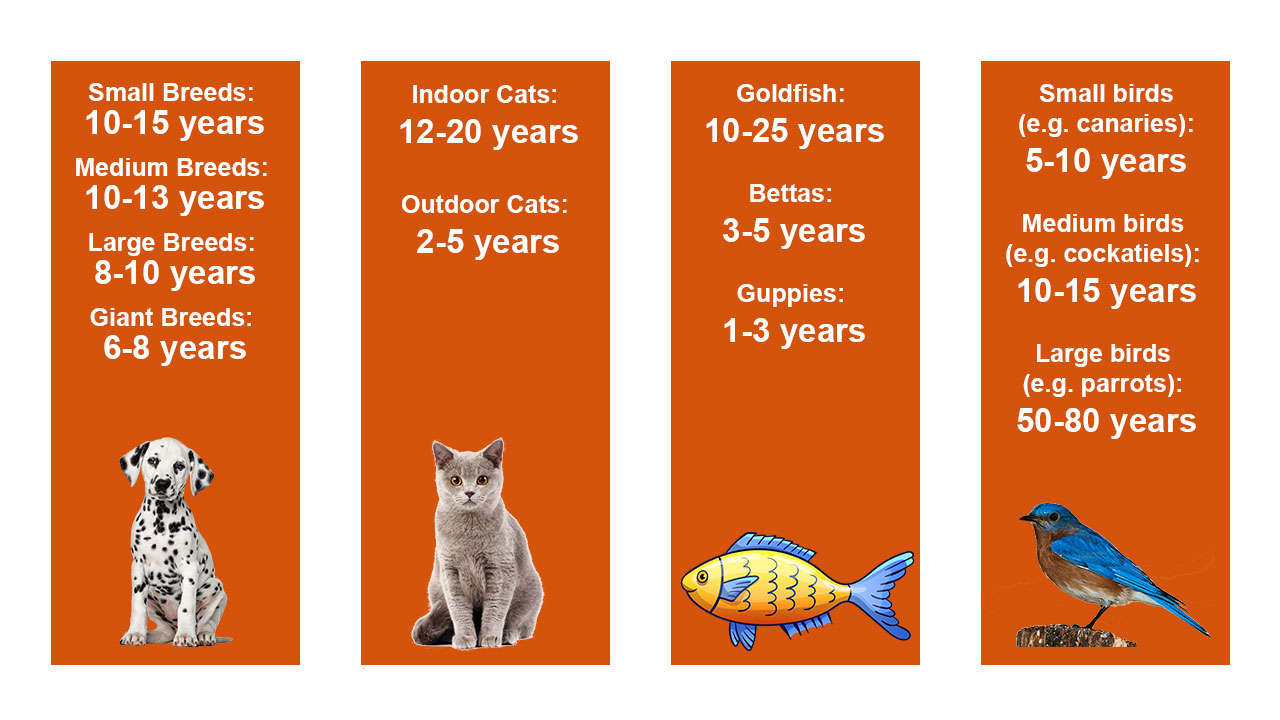Pets are beloved members of our families, they provide us joy, comfort, and companionship. However, the truth is that our beloved pets lifespan is limited, and many pet owners overlook this fact. As a pet owner, it is essential to know how long your pet can be with you, how can we accept the reality of their short lifespan and most importantly how can we extend their lifespan. Here we are discussing to understand the factors that impact our pet’s lifespan, we are going to explore the lifespan of different types of pets and provide tips for extending lifespan.
Table of Contents
How Long Do Different Types of Pets Live?

Dogs
Dogs are one of the most popular types of pets, and their lifespan can vary depending on their breed.
Small Breeds: 10-15 years
Medium Breeds: 10-13 years
Large Breeds: 8-10 years
Giant Breeds: 6-8 years
Cats
Cats are another popular type of pet, and their lifespan can also vary depending on their breed. The average lifespan of a cat is around 15 years, but some breeds can live much longer.
Indoor cats: 12-20 years
Outdoor cats: 2-5 years
Birds
Bird’s lifespan also depends on their breed below are the general lifespans.
Small birds (e.g. canaries): 5-10 years
Medium birds (e.g. cockatiels): 10-15 years
Large birds (e.g. parrots): 50-80 years
Fish
Below are the lifespan of Fish
Goldfish: 10-25 years
Bettas: 3-5 years
Guppies: 1-3 years
Understanding Your Pet’s Lifespan
Several factors can impact your pet’s lifespan, including genetics, size, diet, and exercise. Genetics play a role in determining your pet’s lifespan, with some breeds being predisposed to certain health conditions that can shorten their lifespan. Size also plays a role, with smaller pets generally living longer than larger ones. A well-balanced diet high in protein, vitamins, and minerals can help to extend your pet’s lifespan, and regular exercise is crucial for their health and longevity.
Tips for Extending Your Pet’s Lifespan
Feed a balanced and healthy diet
Choose high-quality pet food that is appropriate for your pet’s age, breed, and activity level. Avoid overfeeding and giving them table scraps or human food that may be harmful to them.
Provide regular exercise and playtime
Regular exercise and playtime can help keep your pet physically and mentally healthy. Take them for walks, play with them, and provide them with toys and other forms of enrichment.
Keep their environment clean and safe
Make sure your pet’s living space is clean, comfortable, and free from hazards. Provide them with a comfortable bed, a clean litter box or cage, and regular grooming.

Regular veterinary check-ups
Take your pet to the vet for regular check-ups and follow their advice on preventative care and treatment of health problems. Keep their vaccinations up-to-date and seek prompt medical attention when needed.
Give them love and attention
Lastly, give your pet plenty of love and attention. Spend quality time with them, cuddle and play with them, and show them how much you care.
How to overcome pet loss grief
Losing a pet can be a devastating experience, and it’s normal to feel a range of emotions including sadness, anger, and loneliness. Coping with the loss of a pet can be a difficult and painful process, but there are steps you can take to help overcome pet loss grief.
Here are some tips to help you cope with the loss of your pet:
- Allow Yourself to Grieve: It is important to accept your feelings and allow yourself to grieve the loss of your pet. Do not try to suppress your emotions or “tough it out”. Grieving is a natural and healthy process that can help you come to terms with the loss of your pet.
- Seek Support: Reach out to family and friends who understand and sympathise with your loss. Consider joining a pet loss support group or seeking the help of a therapist or counsellor who specialises in pet loss grief.
- Memorialise Your Pet: Creating a memorial for your pet can be a helpful way to honour their memory and process your grief. Consider making a scrapbook, creating a memorial website or social media page, making a picture frame or montage, planting a tree or garden in their memory.
- Take Care of Yourself: Make sure you are taking care of yourself physically, emotionally, and mentally. Get enough sleep, exercise, and eat a healthy diet. Engage in activities that bring you joy and help you relax, such as reading, spending time in nature, or practising meditation or yoga.
- Consider Adopting Another Pet: While it’s important to give yourself time to grieve, some pet owners find comfort in adopting another pet. Not only can it help ease your loneliness and provide a distraction from your grief, but it can also give a new pet a loving home.
Remember that everyone grieves differently, and there’s no “right” way to cope with pet loss grief. It’s important to give yourself time and space to grieve and to seek support when needed. With time and self-care, you can heal from the loss of your beloved pet and cherish their memory.











